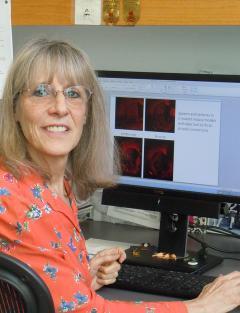-
About
- Departments & Offices
-
Academics
- Physician Assistant
- Special Master’s (MBS)
-
Admissions & Financial Aid
- Tuition & Fees
-
Student Life
-
Research
- Research Labs & Centers
-
Local & Global Engagement
- Global Health Programs
- Community Engagement

Michele Jacob

Research/Areas of Interest
Autism spectrum disorders (ASD) and intellectual disabilities (ID) are highly prevalent developmental brain disorders. Knowledge of the underlying pathophysiological changes is essential for developing therapeutic strategies. Emerging evidence from human genetic studies suggests that several of the risk genes for ASD, ID, and seizures (pediatric epileptic encephalopathies) converge on the adenomatous polyposis coli protein (APC), .-catenin (.-cat), canonical Wnt signaling pathway. However, direct tests that malfunction of this pathway can cause these disorders, and knowledge of the underlying mechanisms, are largely lacking. To address this important question, we have generated several novel mutant mouse lines with gain- or loss- of function in this pathway in neurons of the brain. We are determining the pathophysiological changes on behavioral, molecular, synaptic, and circuit levels. Additionally, we are using pharmacological approaches to test novel molecular targets with potential to ameliorate ID, ASD and seizures and thereby advance the design of effective therapeutic interventions.
Our studies have identified APC as a key regulator of excitatory synaptic maturation and plasticity in both peripheral and central neurons. APC's synaptic functions were undefined prior to our work. Our current findings are identifying additional new roles for APC and .-cat in synaptic plasticity required for learning and memory formation. Our results are providing critical insights into molecular etiologies that cause learning impairments of different severities, autism-like behaviors and chronic seizures.
To gain insights into the underlying pathophysiological changes, we have generated an APC conditional knock-out (cKO) mouse with APC deletion targeted to neurons during synaptic differentiation. APC cKO mice, compared with wild-type littermates, exhibit learning impairments, autism-like behaviors, reduced hearing and chronic seizures (pediatric epileptic encephalopathies) (Mohn et al, 2014; Hickman et al, 2015; Pirone et al, 2017, 2018).
Education
- Doctor of Philosophy, Yale University, USA, 1978
- Bachelor of Science, City University of New York, USA, 1972